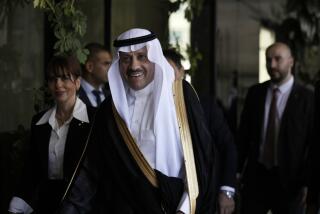Egypt Pushes Arab Leadership Role : Cairo’s Influence Seen as Essential to Mideast Moderates
- Share via
CAIRO — To hear the Egyptian press tell it, President Hosni Mubarak’s presence galvanized the Arab and African leaders who gathered in Addis Ababa for the recent 21st summit meeting of the Organization of African Unity.
“Africa’s benefit from the Egyptian presence was considerable,” the semi-official newspaper Al Akhbar boasted. “For the first time in years, problems and differences failed to impede an African summit. This was achieved as a result of the intensive diplomatic efforts of the Egyptian delegation.”
“Rubbish. Plain rubbish,” retorted a Cairo-based diplomat from another OAU country. “The Egyptian press is always blowing Mubarak’s role out of proportion. It builds up these fantastic expectations and then has to say something to satisfy them. I guess we just have to learn to live with it,” he said with a sigh.
The Egyptian press may have exaggerated Mubarak’s influence at the meeting, the first OAU summit he has attended since becoming president in 1981. But the puffery had a purpose, which was to emphasize Egypt’s role as a regional leader. More important, a diplomat said, it was also meant to remind Cairo’s Arab brethren outside the African continent that “they can no longer afford to ignore or do without Egypt’s influence.”
Foreign Policy Goal
The campaign to maneuver Egypt back into the Arab fold has been a principal preoccupation of Mubarak’s foreign policy ever since he took over from his slain predecessor, Anwar Sadat. But recently, it has been intensified as Egypt seeks to take advantage of ripening developments in the Arab world.
The most important of these, diplomats agree, has been the emergence of a new bloc of moderate Arab leaders united by a number of common interests--rivalry with radical Syria and Libya, aiding Iraq in its war with non-Arab Iran, and the need to contain militant Islamic fundamentalism. “These countries realize that they cannot confront the radicals, the Syrians, the Iranians and the Libyans alone,” says an Arab political analyst. “They need Egypt. They recognize that they must have her leadership.”
Last year, Jordan became the first Arab state to break ranks and re-embrace Egypt, resuming the full diplomatic relations that it severed when Sadat signed a peace treaty with Israel in 1979.
So far, no one else has followed suit. While most Arab countries maintain relations with Egypt in all but name, they have been reluctant to restore formal ties. “Most would like to,” says a Western diplomat, “but they are afraid of what Syria might do.”
Signs of Change
There are signs that this may be changing, however. Recently, a Jordanian proposal to have Egypt’s readmittance put on the agenda of the next Arab League summit meeting received strong support from two of the Arab leaders who helped engineer Egypt’s expulsion from the league in the first place--Iraqi President Saddam Hussein and PLO Chairman Yasser Arafat.
Arafat, announcing to Al Akhbar that he plans to visit Cairo shortly, likened the Arabs without Egypt “to a horse without its rider” and said there “can be no substitute for the Egyptian role in the Arab world.”
And Iraq’s Hussein, in a major speech the next day, denounced Egypt’s opponents as “plotters against Arab unity” and reminded them that “collective action without Egypt is meaningless.”
“It was a remarkably robust statement of support for Egypt,” a Western diplomat said. “It was stronger than anyone expected it to be.”
For Egypt, re-entry into the Arab fold is especially important now, as the United States moves closer to a dialogue on Middle East peace prospects with a joint delegation of Jordanians and Palestinians nominated by Arafat. Persuading the Jordanians to chaperone the Palestinians--and getting Arafat to agree to it--has been Egypt’s major post-Sadat contribution to the peace process, one diplomat noted.
Diplomatic Maneuvering
But Syria remains opposed to the talks and, in the Egyptian view, is likely to try to sabotage them. Thus Egypt’s strategy has been to try to outflank Damascus at every diplomatic turn and confine Syrian influence to Lebanon.
“Readmittance to the Arab League would both strengthen the moderate camp and put the Syrians on the defensive,” one diplomat said. “It would strengthen the peace process and be an important victory for the Egyptians.”
Unfortunately for Mubarak’s diplomatic strategists, however, opposition to Egypt’s rehabilitation does not come solely from Syria or other radicals like Libya and South Yemen.
Indeed, although the Egyptian government will not say so publicly, it considers fellow “moderate” Saudi Arabia the biggest obstacle to Egypt’s readmittance.
“The Saudis have had a heyday in Egypt’s absence (from the Arab world),” an Egyptian political scientist said. “With Egypt out in the cold, Syria bogged down in Lebanon and Iraq preoccupied with its war against Iran, the Saudis have been leading what is left of Arab ranks. But if Egypt returns to the fold, the Saudis will either have to contend with a very experienced partner or take second place.”
“The Saudis are frightened of an Egyptian comeback,” a Western diplomat concurred. “There’s a very tough rivalry between them.”
Fixing the Agenda
Egyptian officials say privately that it is the Saudis who have raised the principal objections to Jordan’s efforts to put Egypt on the agenda of the forthcoming Arab League summit meeting in Casablanca. The agenda for the Aug. 7 meeting will be fixed by Arab League foreign ministers ahead of that date, and senior Egyptian officials say they doubt that the issue will be formally placed before the heads of state this time.
“It will certainly come up for discussion in the corridors but whether it gets beyond that will depend mainly on the Saudis,” a senior Egyptian Foreign Ministry official said. He added that Morocco, which is hosting the summit, also may not want to press the question of Egypt’s readmittance because “it wants to avoid raising subjects on which the Arab world is deeply split.”
In the meantime, many Cairo-based diplomats expect Iraq to restore full diplomatic relations with Egypt in the near future. Relations with Algeria, while not at that stage yet, have also improved.
On the debit side, however, the internal chaos in Sudan, Egypt’s traditional ally, and its growing ties with Libya are being watched with growing alarm in Egypt.
“The Libyans are doing everything they can to stir up trouble between Egypt and Sudan,” a Western diplomat said. “It has the Egyptians quite worried.”
Most Egyptians seem confident, however, that in the long run Egypt will resume its traditional place at the head of the Arab world. “No one can deny us this role,” an Egyptian scholar said, “because no one else is capable of taking Egypt’s place.”
More to Read
Sign up for Essential California
The most important California stories and recommendations in your inbox every morning.
You may occasionally receive promotional content from the Los Angeles Times.













